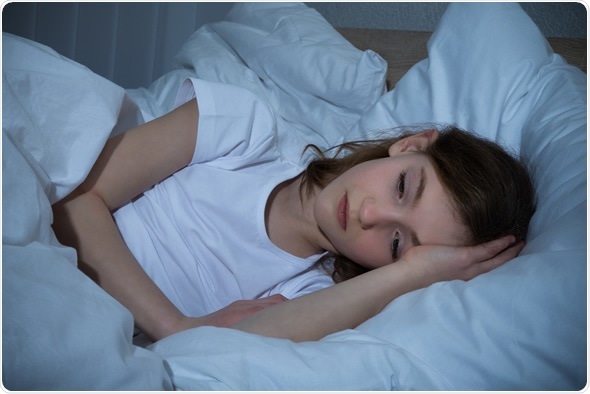For All The Latest Medical News, Health News, Research News, COVID-19 News, Dengue News, Glaucoma News, Diabetes News, Herb News, Phytochemical News, Cardiology News, Epigenetic News, Cancer News, Doctor News, Hospital News
Insomnia is a disturbance in sleep - it may involve difficulty falling or staying asleep and can affect people of all ages, including children. Although older children may self-report symptoms of insomnia, for younger children the parents or caregivers of the child usually notice the symptoms of the condition.

The defining characteristic of insomnia in children is difficulty falling asleep, staying asleep, or waking up very early in the morning. As a result of the poor sleep that does not fully restore their mind, affected children may experience daytime tiredness. This may cause symptoms such as:
Short-term insomnia lasts for a few days or weeks and is caused by temporary factors such as illness or medications. In contrast, long-term insomnia occurs several times a week for at least a month and is caused by ongoing factors such as pain, anxiety, depression or other underlying medical conditions.
In some children who suffer from insomnia, the cause of the condition cannot be established -these are cases of idiopathic insomnia.
Children who have difficulty going to bed or depend on a parent to get them to sleep may also be classified as suffering from insomnia. In these cases, behavioral habits are thought to be the main cause of the problem.
Stress is a significant cause of insomnia in both children and adults. It is important that children feel that they have someone that they can trust to talk about any issues or worries they may have. Many children with insomnia are having difficulty at school or with relating to other children their age. Problems at home, including marital or financial hardship, relocation, or the death of a family member can also have a significant impact.
Substances that can affect alertness or stimulate the nervous system can keep young children awake at night, particularly if they are consumed shortly before bedtime. This may include sodas, energy drinks and candy, which have high caffeine or sugar content. Using screens before bedtime can also stimulate brain activity and promote insomnia.
An underlying medical condition or illness may also cause insomnia in children. For example, rhinitis may cause insomnia in children as their runny or stuffy nose interferes with their breathing and ability to sleep well at night. Itching from eczema or other skin conditions may also pose a problem for the child in getting enough sleep. Other medical conditions that may cause insomnia in children include muscle cramps, heartburn, thyroid abnormalities and neurodevelopment disorders.
Finally, sometimes the sleeping environment may be responsible for causing insomnia in children. This may include factors such as noise, temperature and lighting in the bedroom, as well as the comfort of the bed.
For children who suffer from insomnia, the first step to managing the condition is to ensure good sleep hygiene habits are being encouraged. This may involve:
It is also important to ensure that the sleeping environment promotes sleep. A comfortable temperature with limited light and sound is optimal. It can also be helpful to remove any clocks from the bedroom.
In some cases, behavioral and cognitive therapy may be beneficial to manage insomnia in children. This helps to reduce symptoms of the condition through the use of psychological methods, rather than using drugs to induce sleep. This is thought to be safe and better for the overall health of the child, particularly in the long-term.
Although pharmacological interventions are not usually recommended for children with insomnia due to the long-term effect, they may be recommended by a specialist in some cases.